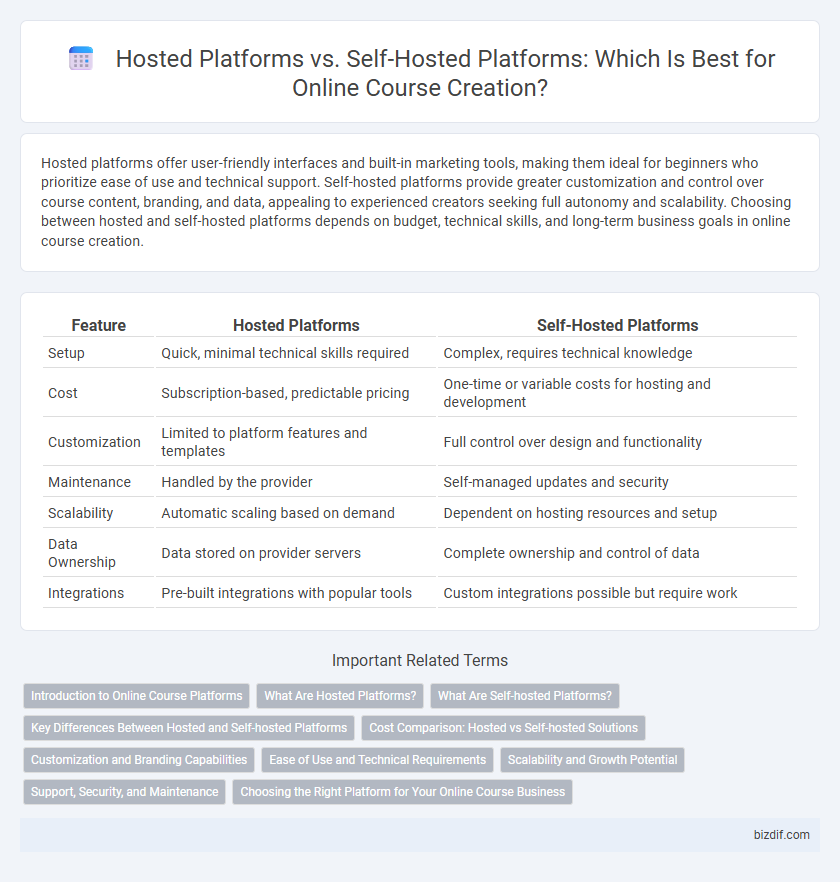Hosted platforms offer user-friendly interfaces and built-in marketing tools, making them ideal for beginners who prioritize ease of use and technical support. Self-hosted platforms provide greater customization and control over course content, branding, and data, appealing to experienced creators seeking full autonomy and scalability. Choosing between hosted and self-hosted platforms depends on budget, technical skills, and long-term business goals in online course creation.
Table of Comparison
| Feature | Hosted Platforms | Self-Hosted Platforms |
|---|---|---|
| Setup | Quick, minimal technical skills required | Complex, requires technical knowledge |
| Cost | Subscription-based, predictable pricing | One-time or variable costs for hosting and development |
| Customization | Limited to platform features and templates | Full control over design and functionality |
| Maintenance | Handled by the provider | Self-managed updates and security |
| Scalability | Automatic scaling based on demand | Dependent on hosting resources and setup |
| Data Ownership | Data stored on provider servers | Complete ownership and control of data |
| Integrations | Pre-built integrations with popular tools | Custom integrations possible but require work |
Introduction to Online Course Platforms
Hosted platforms for online course creation provide built-in tools, easy setup, and integrated payment gateways, making them ideal for beginners and those prioritizing convenience. Self-hosted platforms offer full customization, control over data, and scalability, suited for creators with technical skills seeking tailored student experiences. Choosing between hosted and self-hosted options depends on factors like budget, technical expertise, and desired level of control over course content and user management.
What Are Hosted Platforms?
Hosted platforms for online course creation provide a fully managed environment where course creators can upload content, manage students, and process payments without dealing with technical maintenance or server management. These platforms often include built-in marketing tools, analytics, and customizable templates to streamline course delivery and engagement. Popular hosted platforms include Teachable, Thinkific, and Kajabi, which offer scalability and security optimized for educators.
What Are Self-hosted Platforms?
Self-hosted platforms for online course creation allow educators to retain full control over their website, content, and student data by hosting the course on their own servers or web hosting service. These platforms offer greater customization options, flexibility in design, and integration capabilities but require technical knowledge to manage security, updates, and server maintenance. Popular self-hosted solutions include WordPress with LMS plugins like LearnDash or LifterLMS, empowering course creators with ownership and scalability.
Key Differences Between Hosted and Self-hosted Platforms
Hosted platforms for online course creation offer ease of use, with integrated tools and maintenance handled by the provider, making them ideal for beginners or those seeking quick setup. Self-hosted platforms provide full control over customization, branding, and data ownership but require technical skills and ongoing server management. The choice depends on priorities such as budget, scalability, flexibility, and technical expertise.
Cost Comparison: Hosted vs Self-hosted Solutions
Hosted platforms for online course creation typically involve subscription fees ranging from $29 to $299 per month, covering hosting, maintenance, and customer support, which simplifies budgeting but may limit customization options. Self-hosted platforms incur higher initial costs, including domain purchase, web hosting (averaging $10 to $50 monthly), plugin or software licenses, and potential developer fees, offering greater control and scalability in exchange for increased management responsibility. Evaluating total cost of ownership reveals hosted solutions favor predictable expenses, whereas self-hosted setups demand ongoing investment in updates and security, affecting overall affordability based on technical expertise and business goals.
Customization and Branding Capabilities
Hosted platforms offer limited customization and branding options, often restricting course creators to predefined templates and brand styles. Self-hosted platforms provide full control over design, layout, and branding elements, enabling a unique and fully personalized user experience. This flexibility is crucial for businesses seeking to maintain consistent brand identity and differentiate their online courses.
Ease of Use and Technical Requirements
Hosted platforms offer a user-friendly interface with minimal technical requirements, allowing course creators to quickly set up and manage content without needing coding skills. Self-hosted platforms require more technical expertise, including handling server management, security, and software updates, which can increase complexity and setup time. Choosing between the two depends on the creator's technical proficiency and desire for customization versus convenience.
Scalability and Growth Potential
Hosted platforms offer streamlined scalability through managed infrastructure and automatic updates, enabling course creators to easily reach a global audience without technical overhead. Self-hosted platforms provide greater control and customization, but require significant investment in server management and maintenance to support growth. Choosing between hosted and self-hosted solutions depends on the desired balance between ease of scaling and the flexibility needed for long-term expansion.
Support, Security, and Maintenance
Hosted platforms offer dedicated support teams, regular security updates, and handle all maintenance tasks, ensuring a seamless experience for course creators. Self-hosted platforms require manual management of security patches, ongoing technical maintenance, and often rely on limited, community-based support. Choosing between hosted and self-hosted solutions impacts the level of control, responsibility, and reliability in managing online course environments.
Choosing the Right Platform for Your Online Course Business
Selecting the right platform for your online course business depends on control, customization, and scalability needs. Hosted platforms like Teachable or Udemy offer ease of use, built-in marketing tools, and maintenance handled by the provider but limit customization and branding options. Self-hosted platforms such as WordPress with LearnDash provide full control, flexible monetization, and integration capabilities, ideal for businesses aiming for long-term growth and personalized learner experiences.
Hosted platforms vs Self-hosted platforms Infographic

 bizdif.com
bizdif.com